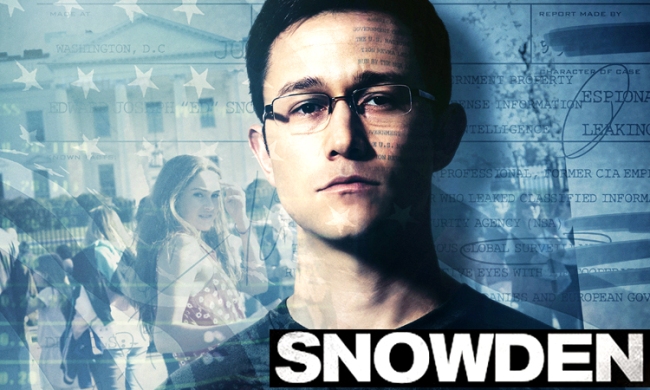 September
26
September
26
Tags
Snowden (2016)

Director Oliver Stone took a risk in making Snowden (2016). Not because of America’s continuing legal vendetta against exiled Edward Snowden but because the definitive film about Snowden was already made in the multi-award winning documentary CitizenFour (2014). However, Stone’s film goes beyond the act of whistle-blowing to explore who Snowden is and why he leaked. To do this, he incorporates the making of the 2014 documentary into his bio-pic thriller and adds a romantic back story to humanise the world’s best know computer geek.
The Snowden plotline consists of known facts and a liberal dose of creative dramatisation. It is focused on the several days during which Snowden (Joseph Gordon-Levitt) was holed up in a Singapore Hotel with journalists while legal clearances were obtained for media publication of his massive leak of classified NSA intelligence. During this time, there are several flashbacks to different points in Snowden’s career that trace his progression from a rising star in the intelligence industry to his disillusionment about America’s surveillance of enemies and ordinary citizens.
While the Snowden story unfolds, the CitizenFour documentary is happening in the same hotel room, a clever device that adds authenticity. The flashbacks include scenes that could have been lifted from Eye in the Sky (2016) where American missiles zero-in on humans guided by cell phone signals. Surveillance technology has advanced to the point that almost anyone can be watched through common domestic devices, while agencies like the NSA publicly deny the scale of their spying operations. This is the hypocrisy that radicalised Snowden into blowing the whistle.
The clinical facts behind the Snowden story are alarming and their implications are so profound that most people cannot imagine, let alone articulate, what mass surveillance means for the future of democracies around the world. But we are talking cinema not politics, and Snowden tells a great story about an unusual individual. The back-story of his love life softens the narrative without melodrama and provides relief from the film’s density of forensic detail. The two and a quarter hour long film could have been trimmed without harming the narrative but the acting and directing sustains the thriller edge of the story. Whether Stone’s portrait appears too saintly or overly supportive of petitions to pardon Snowden is a matter of judgement. In any case, this is a well-made and engaging film that presents Snowden as a principled romantic and modest hero.

Director: Oliver Stone
Stars: Joseph Gordon-Levitt, Shailene Woodley, Melissa Leo

Great review!
LikeLiked by 1 person
Interesting review mate. We obviously have very opposing viewpoints but you certainly raise a ton of valid points. For me though, the romantic angle seemed half-cocked, but I see what you are saying in that it humanises the man and shows what he had to sacrifice. And yes, it is certainly very one-sided! The run-time also felt very long to me as well. The jumps from the scenes in Hong Kong to the scenes of his past felt a bit jerky to me, but of course that is just a matter of opinion. I’ll probably re-evaluate this one later on, but for now I’m sticking with Citizenfour. For me it has all the urgency and tension that this film didn’t have. Looking back though, perhaps I was a bit too harsh on this one. Like I said, you make a lot of good points
LikeLiked by 1 person
I was likewise impressed by CitizenFour and was not sure what Stone could achieve by framing a movie around it. But I think it works well and adds to, rather than subtracts from, the Snowden legend.
LikeLiked by 1 person
It certainly adds to the story rather that subtracting from it, but I still left the film feeling like I hadn’t got to know the guy any better, which was what I was hoping for.
LikeLiked by 1 person
oh, and a random question, but you don’t happen to be from Australia do you? I just saw the list of reviews on the right and it seems to coincide with Australian release dates.
LikeLike
Yes, I’m in Sydney. I try to cover most of the Aussie new releases but I’m interested in all films. Did you see Spin Out?
LikeLike
No I didn’t bother, looked a bit crap if I’m honest!. And greetings from Adelaide!…. Where tons of movies never play!! 😛
LikeLiked by 1 person